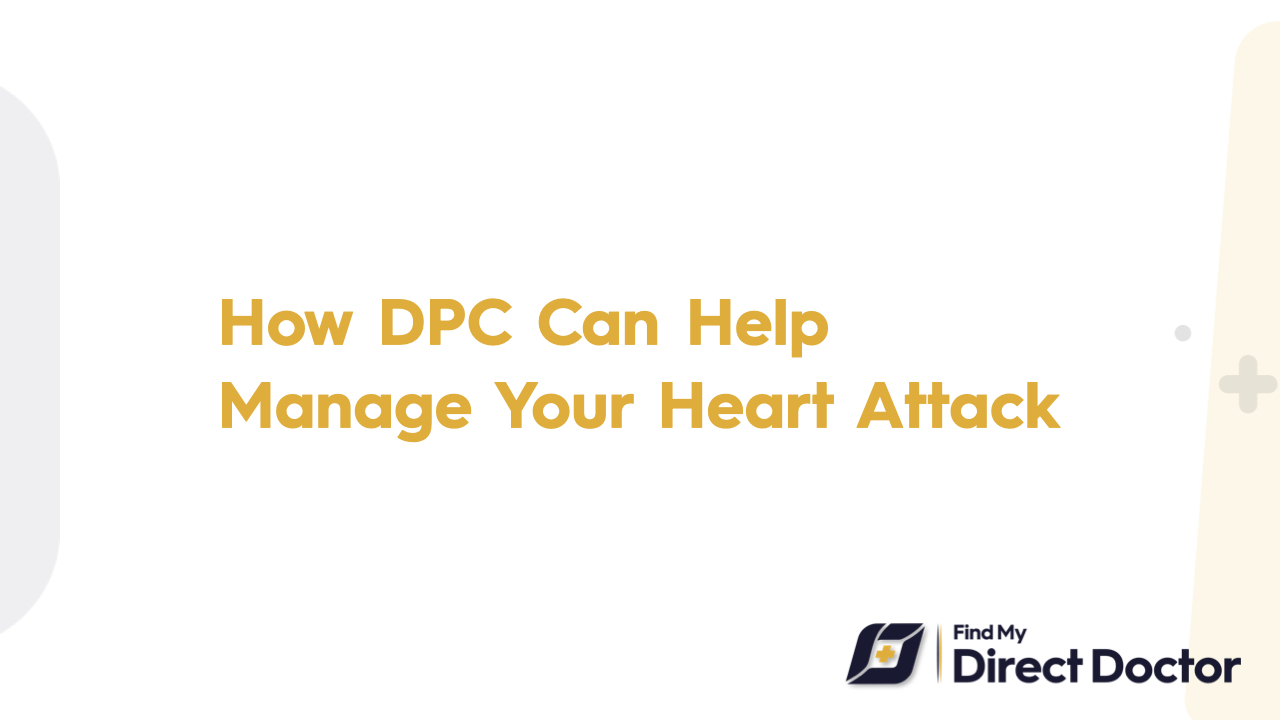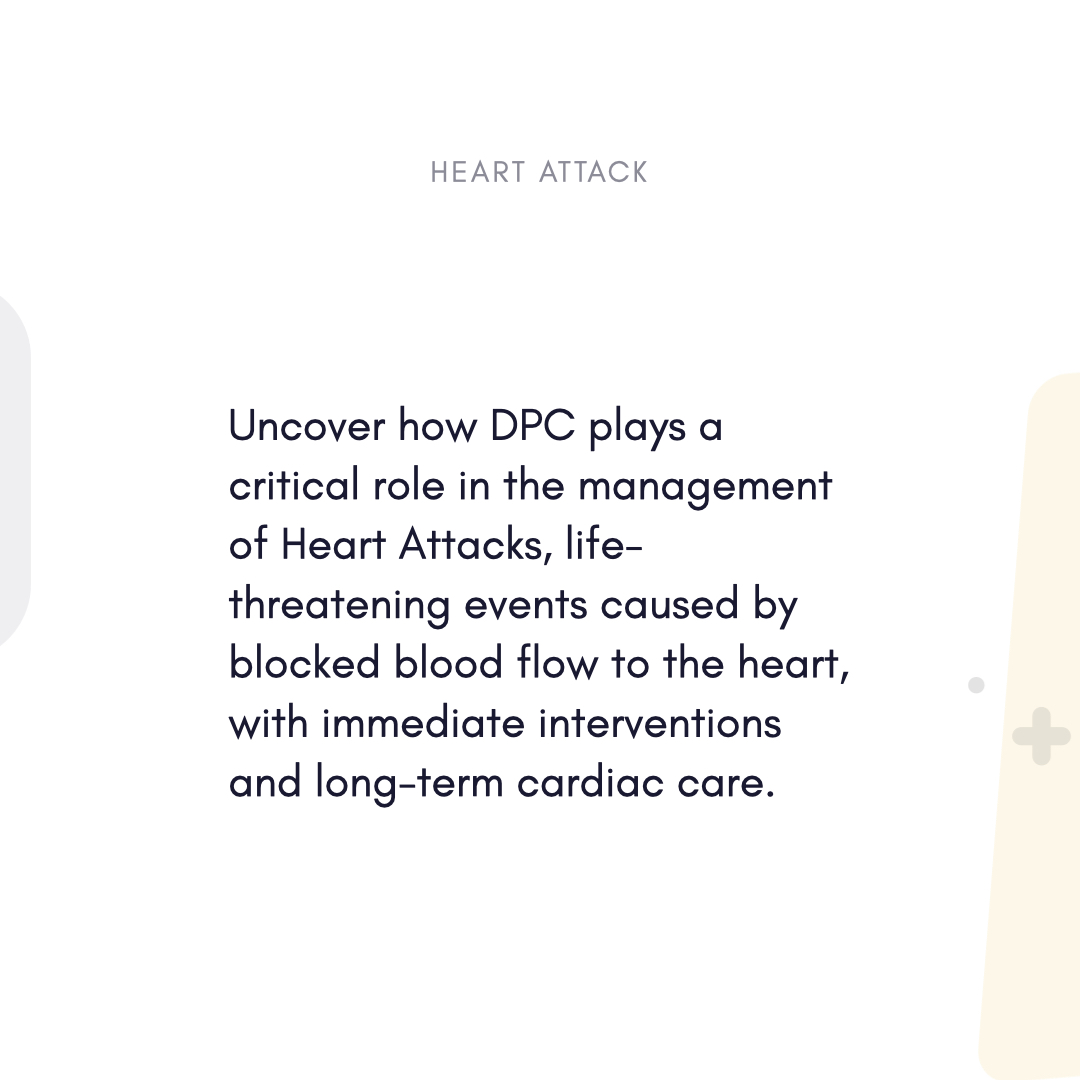Heart Attack (Myocardial Infarction) and Direct Primary Care (DPC): Lifesaving Coordination and Lifelong Prevention
A heart attack results from blockage of blood flow to the heart, so irreversibly damaging heart muscle. Although long-term management—medication adherence, lifestyle changes, and prevention of recurrence—is equally important, immediate intervention is absolutely vital. With flat monthly fees and a membership-based approach, Direct Primary Care (DPC) empowers heart attack patients with fast acute care coordination, tailored rehabilitation, and relentless support to lower risks and improve outcomes.

Knowing Heart Attacks
- Causes: Blood clots, coronary artery disease (plaque accumulation), or coronary artery spasms.
- Symptoms: Shortness of breath, nausea, arm/jaw pain, cold sweats, and chest discomfort/pressure.
- Diagnosis: Angiography, ECG, troponin blood tests.
- Treatment:
- Emergency: Bypass surgery, angioplasty or stenting, or clot-busting drugs.
- Long-Term: Lifestyle changes, statins, antiplatelets, beta-blockers, cardiac rehab.
How DPC Improves Heart Attack Care
DPC Improves Heart Attack Control
-
Quick Emergency Coordination & Response:
- Teach patients to identify symptoms and immediately call 911. Pre-hospital advocacy helps this.
- Share important patient history (medications, allergies) with ER teams to speed treatment and conform with American College of Cardiology recommendations for early intervention.
-
Post-Attack Secondary Prevention & Rehabilitation:
- Medication optimization: Change statin, beta-blocker, or ACE inhibitor dosage to strike a mix between side effects and effectiveness.
- Cardiac rehab plans: Work with physiotherapleness on tailored, supervised exercise plans.
- Under regular monitoring, tightly control LDL cholesterol, diabetes, and hypertension.
-
Preventive Maintenance & Lifestyle Counseling:
- Work with dietitians to create heart-healthy DASH, Mediterranean, diets.
- Smoking cessation & stress reduction: Offer tools and counseling to handle main risk factors.
Key Benefits of DPC for Heart Attack Patients
-
Improved Timely Care and Accessibility:
- 24/7 Telehealth: Without ER delays, address post-discharge issues including medication side effects and chest discomfort.
- Through consistent follow-ups, track recovery, modify treatments, and prevent readmissions.
-
Transparent, Affordable Pricing:
- Flat monthly fees (USD 100–200) cover unlimited visits, care coordination, and basic medications—no surprise bills.
- Preventive savings: Minish expensive complications (heart failure) and avoid needless hospital stays.
-
Customized, Ongoing Treatment:
- Spend time teaching patients warning signs, medication adherence, and lifestyle changes.
- Mental health support: Link patients to counseling and screen for depression or anxiety following a heart attack.
DPC Customized Heart Attack Management
- Personalized Risk Reduction:
- Genetic testing helps find hereditary disorders including familial hypercholesterolemia.
- Track heart function recovery by timing echocardiograms or stress tests.
- Regular blood pressure checks and lipid panels meet ACC/AHA targets for integrated secondary prevention and management of dyslipidemia.
- Lifestyle Integration:
- Tight glycemic control lowers cardiovascular load.
- Family & Community Support:
- Instruct family members in emergency response.
- Link patients to nearby cardiac wellness programs.
Real-World Impact: A DPC Success Story
- Maria's DPC provider optimized her medications following her heart attack, addressing statin-related muscular pain.
- Registered her in a cardiac rehabilitation program; in twelve weeks her stamina increased by forty percent.
- Guided her toward a Mediterranean diet and smoking cessation.
- Maria's LDL dropped to 65 mg/dL and she has stayed event-free for two years.
Frequently Asked Questions About DPC and Heart Attacks
- Q: Can DPC manage an emergency including a heart attack?
- A: No; get right on calling 911. DPC works with ER teams and supports pre- and post-hospital treatment.
- Q: Does DPC cover cardiac rehabilitation programs?
- A: DPC arranges rehab; many have sliding-scale rates even though they may bill separately.
- Q: How does DPC control prescription expenses?
- A: DPC works out wholesale generic pricing (e.g., metoprolol, atorvastatin).
- Q: Can DPC help prevent a second heart attack?
- A: It is indeed. Through proactive risk factor management, recurrence risk drops up to 50%.
How DPC Specifically Helps Heart Attack Patients
- Flawless Coordination: Bridge gaps between ER, cardiologists, and rehab teams.
- Aggressive Prevention: Control BP, cholesterol, and lifestyle choices to lower recurrence.
- Empowerment Tools: Enable patients to take control of their heart condition.
- Transparent Pricing: Guarantees accessibility of care free from financial burden.
Why DPC Changes Everything for Heart Attack Patients
DPC's approach directly fills systematic voids in cardiac treatment:
- Timely Interventions: Early acute coronary syndromes identification and quick coordination with ER teams.
- Continuity of Care: Strict adherence to secondary prevention plans following discharge.
- Holistic Support: Combining medical management with mental health, nutrition, and community resources.
Take Control of Your Heart Health Right Now
Not a life sentence, a heart attack is more of a wake-up call. DPC gives you a partner committed to fast post-attack support, customized prevention, and lifetime guidance to keep your heart strong. All set to confidently manage your heart health? Look for a DPC provider close by and enjoy proactive, patient-centered care.






